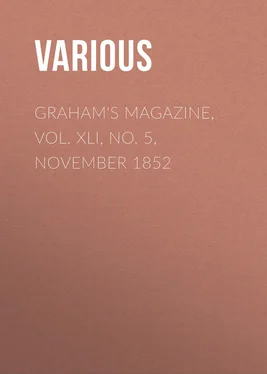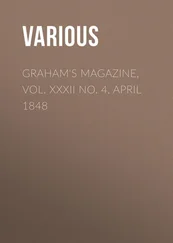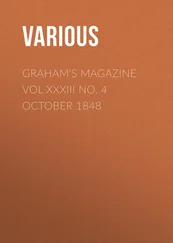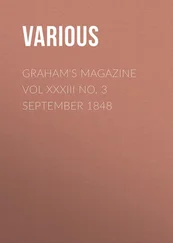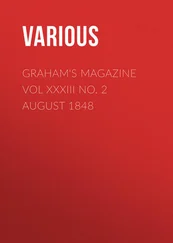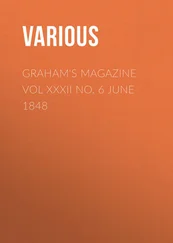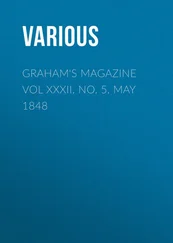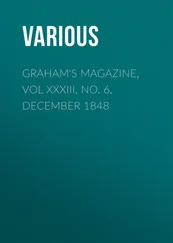Various - Graham's Magazine, Vol. XLI, No. 5, November 1852
Здесь есть возможность читать онлайн «Various - Graham's Magazine, Vol. XLI, No. 5, November 1852» — ознакомительный отрывок электронной книги совершенно бесплатно, а после прочтения отрывка купить полную версию. В некоторых случаях можно слушать аудио, скачать через торрент в формате fb2 и присутствует краткое содержание. Издательство: Иностранный паблик, Жанр: periodic, literature_19, foreign_edu, на английском языке. Описание произведения, (предисловие) а так же отзывы посетителей доступны на портале библиотеки ЛибКат.
- Название:Graham's Magazine, Vol. XLI, No. 5, November 1852
- Автор:
- Издательство:Иностранный паблик
- Жанр:
- Год:неизвестен
- ISBN:нет данных
- Рейтинг книги:4 / 5. Голосов: 1
-
Избранное:Добавить в избранное
- Отзывы:
-
Ваша оценка:
- 80
- 1
- 2
- 3
- 4
- 5
Graham's Magazine, Vol. XLI, No. 5, November 1852: краткое содержание, описание и аннотация
Предлагаем к чтению аннотацию, описание, краткое содержание или предисловие (зависит от того, что написал сам автор книги «Graham's Magazine, Vol. XLI, No. 5, November 1852»). Если вы не нашли необходимую информацию о книге — напишите в комментариях, мы постараемся отыскать её.
Graham's Magazine, Vol. XLI, No. 5, November 1852 — читать онлайн ознакомительный отрывок
Ниже представлен текст книги, разбитый по страницам. Система сохранения места последней прочитанной страницы, позволяет с удобством читать онлайн бесплатно книгу «Graham's Magazine, Vol. XLI, No. 5, November 1852», без необходимости каждый раз заново искать на чём Вы остановились. Поставьте закладку, и сможете в любой момент перейти на страницу, на которой закончили чтение.
Интервал:
Закладка:
In another respect I cannot precisely agree with the acute and observant naturalist quoted above, as to its ungregarious nature, since on more occasions than one I have seen these birds together in such numbers, and under such circumstances of association, as would certainly justify the application to them of the word flock .
One of these occasions I remember well, as it occurred while snipe-shooting on the fine marshes about the riviere aux Canards in Canada West, when several times I saw as many as five or six flush together from out of the high reeds, as if in coveys; and this was late in September, so that they could not well have been young broods still under the parental care.
At another time I saw them in yet greater numbers and acting together, as it appeared, in a sort of concert. I was walking, I cannot now recollect why, or to what end, along the marshes on the bank of the Hackensack river, between the railroad bridge and that very singular knoll named Snakehill, which rises abruptly out of the meadows like an island out of the ocean. It was late in the summer evening, the sun had gone quite down, and a thick gray mist covered the broad and gloomy river. On a sudden, I was almost startled by a loud quawk close above my head; and, on looking up, observed a large Bittern wheeling round and round, now soaring up a hundred feet or more, and then suddenly diving, or to speak more accurately, falling , plump down, with his legs and wings all relaxed and abroad, precisely as if he had been shot dead, uttering at the moment of each dive a loud quawk . While I was still engaged in watching his manœuvres, he was answered, and a second Bittern came floating through the darksome air, and joined his companion. Another and another followed, and within ten or twelve minutes, there must have been from fifteen to twenty of these large birds all gamboling and disporting themselves together, circling round one another in their gyratory flight, and making the night any thing, certainly, but melodious by their clamors. What was the meaning of those strange nocturnal movements I cannot so much as guess; it was not early enough in the spring to be connected in any way with the amatory propensities of the birds, or I should have certainly set it down, like the peculiar flight, the unusual chatter, and the drumming, performed with the quill-feathers, of the American snipe — Scolopax Wilsonii – commonly known as the English snipe, during the breeding season, as a preliminary to incubation, nidification, and the reproduction of the species – in a word, as a sort of bird courtship. The season of the year put a stopper on that interpretation, and I can conceive none other than that the Quawks were indulging themselves in an innocent game of romps, preparatory to the more serious and solemn enjoyment of a fish and frog supper.
The Bittern, it appears, on the Severn river, emptying into Hudson’s Bay, makes its nest in the long grass of the marshes, and there lays its eggs and rears its black, downy young; but several years ago, while residing at Bangor, in Maine, while on a visit to a neighboring heronry, situated on an island covered with a dense forest of tall pines and hemlocks, I observed a pair of Bitterns flying to and fro, from the tree-tops to the river and back, with fish in their bills, among the herons which were similarly engaged in the same interesting occupation of feeding their young. One of these, the male bird, I shot, for the purpose of settling the fact, and we afterward harried the nest, and obtained two full-grown young birds, almost ready to fly.
Hence, I presume, that, like many other varieties of birds, the Bittern adapts his habits, even of nidification, to the purposes of the case, and that where no trees are to be found, in which he can breed, he makes the best he can of it, and builds on the ground; but it is my opinion that his more usual and preferred situation for his nest is in high trees, as is the case with his congeners, the Green Bittern, the blue heron, the beautiful white egret, the night heron, which may be all found breeding together in hundreds among the red cedars on the sea beach of Cape May. The nest, which I found in Maine, was built of sticks, precisely similar to that of the herons.
The Bittern is a more nocturnal bird than the heron, and is never seen, like him, standing motionless as a gray stone, with his long slender neck recurved, his javelin-like bill poised for the stroke, and his keen eye piercing the transparent water in search of the passing fry.
All day he rambles about among the tall grass and reeds of the marshes, sometimes pouncing on an unfortunate frog, a garter-snake, or a mouse, for, like the blue heron, he is a clever and indefatigable mouser; but when the evening comes, he bestirs himself, spreads his broad vans, rises in air, summoning up his comrades by his hoarse clang, and wings his way over the dim morasses, to the banks of some neighboring rivulet or pool, where he watches, erect sentinel, for the passing fish, shiners, small eels, or any of the lesser tribes of the cyprinidæ, and whom he detects, wo-betide; for the stroke of his sharp-pointed bill, dealt with Parthian velocity and certitude by the long arrowy neck, is sure death to the unfortunate.
Mr. Giraud, in his excellent book on the birds of Long Island, thus speaks of the American Bittern, and that so truthfully and agreeably withal, that I make no apology for quoting his words at length.
“This species is said to have been the favorite bird of the Indians, and at this day is known to many persons by the name of “Indian Hen,” or “Pullet,” though more familiarly by the appellation of “Look-up,” so called from its habit, when standing on the marshes, of elevating its head, which position, though probably adopted as a precautionary measure, frequently leads to its destruction. The gunners seem to have a strong prejudice against this unoffending bird, and whenever opportunity offers, seldom allow it to escape. It does not move about much by day, though it is not strictly nocturnal, but is sometimes seen flying low over the meadow, in pursuit of short-tailed or meadow-mice, which I have taken whole from its stomach. It also feeds on fish, frogs, lizards, etc.; and late in the season, its flesh is in high esteem – but it cannot be procured in any number except when the marshes are overflowed by unusually high tides, when it is hunted much after the manner the gunners adopt when in pursuit of rail. On ordinary occasions, it is difficult to flush; the instant it becomes aware that it has attracted the attention of the fowler, it lowers its head and runs quickly through the grass, and when again seen, is usually in a different direction from that taken by its pursuer, whose movements it closely watches; and when thus pursued, seldom exposes more than the head, leading the gunner over the marsh without giving him an opportunity to accomplish his purpose.
“When wounded, it makes a vigorous resistance, erects the feathers on the head and neck, extends its wings, opens its bill, and assumes a fierce expression – will attack the dog, and even its master, and when defending itself, directs its acute bill at its assailant’s eye. It does not usually associate with other herons, nor does it seem fond of the society of its own species. Singly or in pairs it is distributed over the marshes, but with us it is not abundant.”
The geographical range of this bird is, as I have before stated, very extensive, extending from the shores of Hudson’s Bay, in the extreme north, so far south at least as to the Cape of Florida, and probably yet farther down the coasts of the Mexican gulfs.
That fanciful blockhead, the Count de Buffon – for he was a most almighty blockhead when he set himself drawing on his imagination for facts – with his usual eloquent absurdity, describes the species as “exhibiting the picture of wretchedness, anxiety, and indigence; condemned to struggle perpetually with misery and want; sickened with the restless cravings of a famished appetite;” a description so ridiculously untrue, that were it possible for these birds to comprehend it, it would excite the risibility of the whole tribe.
Читать дальшеИнтервал:
Закладка:
Похожие книги на «Graham's Magazine, Vol. XLI, No. 5, November 1852»
Представляем Вашему вниманию похожие книги на «Graham's Magazine, Vol. XLI, No. 5, November 1852» списком для выбора. Мы отобрали схожую по названию и смыслу литературу в надежде предоставить читателям больше вариантов отыскать новые, интересные, ещё непрочитанные произведения.
Обсуждение, отзывы о книге «Graham's Magazine, Vol. XLI, No. 5, November 1852» и просто собственные мнения читателей. Оставьте ваши комментарии, напишите, что Вы думаете о произведении, его смысле или главных героях. Укажите что конкретно понравилось, а что нет, и почему Вы так считаете.
